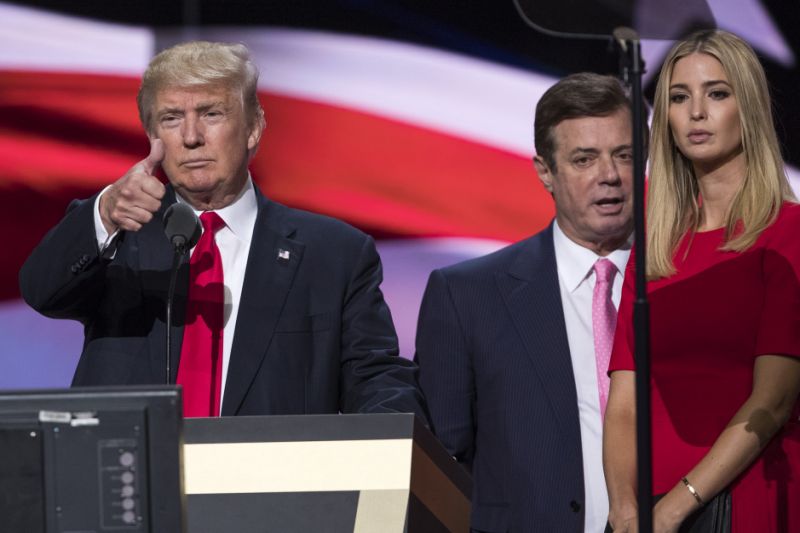The latest:
Rick Gates done gone and flipped, folks. And he must have flipped good.
The lead Russia investigator asked a federal court in Alexandria, Virginia Tuesday to dismiss a series of criminal charges against Gates, including tax and bank fraud, in exchange for his guilty plea and testimony in the wider probe into the 2016 presidential election. …
… The additional leniency comes after Gates agreed to a plea deal last Friday with Mueller that stipulates he must cooperate “in any and all matters†that the special counsel’s office decides are “relevant.â€
Gates likely can help the government in its prosecution of his longtime business partner Paul Manafort, the former Trump campaign chairman who is fighting Mueller’s indictments for money laundering, failing to register as an agent of a foreign government, and bank and tax fraud.
Gates is also expected to provide a wider window for Mueller into the Trump campaign, where he worked as deputy chairman under Manafort and later as a liaison to the Republican National Committee.
But Manafort is still fighting. The Gates news was yesterday; today Manafort pleaded not guilty to some of the charges against him, including some brand new ones.
Manafort and Gates were originally indicted in Washington in October on charges of conspiracy and fraud stemming from their lucrative lobbying work in Ukraine — a case that arose out of Mueller’s investigation of Russian interference in the 2016 campaign and possible ties to the Trump campaign.
AÂ second federal indictment charging the pair with new tax and bank fraudcharges related to real-estate loans was lodged against them in Virginia last week.
Soon after, prosecutors announced they had struck a cooperation agreement with Gates, who is a former Trump campaign aide. And hours later, Manafort was hit with new charges in Washington — including an accusation that he secretly recruited and funded a group of former European politicians to lobby in the United States on behalf of Ukraine.
Let’s start with one key point: The main deliverable Vladimir Putin wanted from the Trump administration, whatever role he played in the latter’s election, was an end to the punitive sanctions imposed by the US and Europe after the Russian seizure of the Crimean Peninsula and incursions into eastern Ukraine in February 2014. There are many parts of the package Putin wanted and Trump seemed to want to provide, from things as limited as the late 2016 sanctions imposed by President Obama to as maximal and aspirational as the disruption of the NATO alliance. But the end of the 2014 sanctions and the acceptance of Russian sovereignty in Crimea was the core deliverable at the heart of a broader rapprochement or even global US-Russian partnership. That was the big thing Russia wanted and indeed still wants.
Manafort wasn’t simply at the heart of the 2016 election story, he was at the center of this origination point story as well. Manafort’s meal ticket and main client was Viktor Yanukovych, the Russia-aligned President of Ukraine. Yanukovych was driven from power by his inability to manage the cross-cutting fissures in Ukraine, the pulls of Russia and the EU, specifically his decision to reject a deeper association with the EU and swing around to a redoubled bond with Russia. It was Yanukovych’s fall from power and subsequent flight to Russia which at least triggered the annexation of Crimea and Russia’s shadow war in the east. In other words, the fall of Manafort’s client in Ukraine was the triggering event which led to the punitive sanctions the removal of which was the core thing Vladimir Putin was hoping to receive from Donald Trump. That Manafort, who’d been Yanukovych’s political advisor and fixer for a decade would end up running Trump’s campaign is, to put it mildly, remarkable.Â
Do read all the juicy details in Josh Marshall’s piece. Note that we have to wait until September for Mueller’s trial. But we’re not done.
Reports are that people being interviewed by Mueller are being asked very pointed questions about what Trump might have known about stolen Democratic Party emails before they were released.
Witnesses who were involved with Trump’s campaign are being asked if the president knew that WikiLeaks was going to publish the stolen emails, according to NBC News. Particular attention has been paid to Trump’s infamous July 2016 public comments at a news conference shortly after WikiLeaks began publishing Democratic National Committee emails.
“Russia, if you’re listening, I hope you’re able to find the 30,000 emails that are missing,” Trump told reporters at the time.
The investigators are also probing whether Trump had prior knowledge of WikiLeaks’ plans to publish the Democratic emails and why Trump has consistently taken pro-Russia policy positions that have seemingly conflicted with his otherwise hawkish foreign policy views. There have also been questions about the connections between Roger Stone and Julian Assange, the founder of WikiLeaks and a man known to have been compromised by the Russian government. It had already been reported in The Atlantic that Stone exchanged direct messages with WikiLeaks, and in November it came out in The Atlantic that Assange had asked the Trump campaign to be made into Australia’s ambassador to the United States.
Even better, Mueller has taken an interest in Trump’s business dealings in Russia before he began campaigning for president:
Three people familiar with Mueller’s investigation have told CNN’s Kara Scannell, Pamela Brown, Gloria Borger, and Jim Sciutto that the special counsel has started questioning witnesses about Trump’s dealings in Russia — specifically the fate of a Trump Tower in Moscow — and when exactly Trump made the decision to run for president. Mueller may also be digging into whether there’s any compromising information on Trump that might connect the two, one source speculated to CNN. …
…Mueller’s team is trying to pinpoint when Trump became serious about a presidential run, and if it might coincide with any sketchy business dealings. A source told CNN that “a witness told Mueller’s team his impression was that Trump was serious about running back in 2014,†and that Mueller’s team also wanted to know if Russians had visited Trump Tower in New York before 2015. This unnamed witness reportedly said no.
Trump’s 2013 trip to Moscow for the Miss Universe pageant has attracted much attention in the Russia scandal — and the CNN report says that Muller also put it under scrutiny. Investigators are interested in who Trump met with during his time there.
That Russia visit has long been an odd bullet point in the Trump-Russia saga — one that has continued to pop up because the Russian financiers who helped bankroll the pageant helped arrange the infamous 2016 Trump Tower meeting with Don Jr. regarding promised dirt on Hillary Clinton.
The CNN report suggests that Mueller is also interested in the scrapped plans for a Trump Tower in Moscow — both the one in 2013 connected to the Miss Universe pageant and a renewed attempt led by Trump Organization lawyer Michael Cohen in 2015. (Cohen says he ended negotiations in January 2016.)
But wait, there’s more. Recently Trump’s 2020 reelection campaign announced that a fellow named Brad Parscale would be campaign manager. Who is Brad Parscale? The short answer is that he was the guy in charge of digital strategy in the 2016 campaign. “Digital strategy” in this case was mostly about getting word out on social media, especially Facebook. Here’s a December 2017 article by Sean Illing at Vox explaining why this is a big deal.
In June 2016, the Trump campaign hired Cambridge Analytica to take over its data operations.
We know from the reporting of Nicholas Confessore and Danny Hakim at the New York Times that Jared Kushner, who was charged with overseeing Trump’s digital operations, is the reason Cambridge Analytica joined the Trump campaign.
Kushner hired a man named Brad Parscale, a Texas-based digital expert who had worked previously for team Trump. According to Confessore and Hakim, Cambridge Analytica convinced Parscale (who has since agreed to be interviewed by the House Intelligence Committee) to “try out the firm.†The decision was reinforced by Trump’s campaign manager, Steve Bannon, who is also a former vice president of Cambridge Analytica.
It’s not clear to what extent Cambridge Analytica helped (Parscale denied that Cambridge was of any use in a recent 60 Minutes interview), but we do know that Trump’s digital operation was shockingly effective. Samuel Woolley, who heads the Computational Propaganda project at Oxford’s Internet Institute, found that a disproportionate amount of pro-Trump messaging was spread via automated bots and anti-Hillary propaganda. Trump’s bots, they reported at the time of the election, outnumbered Clinton’s five to one.
So there’s more detail about what all these bots were up to, and then …
In early July, Shane Harris of the Wall Street Journal released a series of reports that offered some of the most compelling evidence yet that Trump’s campaign colluded with Russian hackers.
Harris interviewed a man named Peter Smith, a pro-Trump GOP operative who sought to acquire the 30,000 deleted emails from Hillary Clinton’s private server. Of the several hacker groups Smith reached out to, at least two had connections to Russia — that’s according to Smith.
Smith told Harris that he was in regular contact with Gen. Michael Flynn, who at the time was one of Trump’s closest confidants — and of course later became Trump’s national security adviser.
Here’s a key passage from the Harris report, which my Vox colleague Andrew Prokop highlighted at the time:
“He [Smith] said, ‘I’m talking to Michael Flynn about this — if you find anything, can you let me know?’†said Eric York, a computer-security expert from Atlanta who searched hacker forums on Mr. Smith’s behalf for people who might have access to the emails. …
…In phone conversations, Mr. Smith told a computer expert he was in direct contact with Mr. Flynn and his son, according to this expert. … The expert said that based on his conversations with Mr. Smith, he understood the elder Mr. Flynn to be coordinating with Mr. Smith’s group in his capacity as a Trump campaign adviser.
Harris examined intelligence reports that described the efforts of Russian hackers to retrieve emails from Clinton’s server and pass them along to Flynn, who would then share them with the Trump campaign.
By itself, Harris’s reporting makes no connection to Cambridge Analytica. But in August the Associated Press published a report that helped connect the dots. In an amended public financial filing, Flynn was forced to disclose “a brief advisory role with a firm related to a controversial data analysis company that aided the Trump campaign.â€
The “data analysis company†is none other than Cambridge Analytica. The precise amount of money Cambridge paid to Flynn is unknown, as are the details of Flynn’s role.
Of course, Jared also in the news for losing his temporary security clearance. He is now downgraded to seeing only “secret,” as opposed to “top secret,” material. That ought to remove him from any further dealings in foreign policy, but we’ll see. See also Charles Pierce.
Trump today is spinning his wheels over the Nunes memo and the phony issue that the FBI and Justice Department somehow stricked a judge into issuing a FISA warrant based on the Steel Dossier. I’ve already discussed this to death here. Trump is furious at Jeff Sessions for not prosecuting somebody already.
Why is A.G. Jeff Sessions asking the Inspector General to investigate potentially massive FISA abuse. Will take forever, has no prosecutorial power and already late with reports on Comey etc. Isn’t the I.G. an Obama guy? Why not use Justice Department lawyers? DISGRACEFUL!
— Donald J. Trump (@realDonaldTrump) February 28, 2018
Sessions has responded by saying, “We have initiated the appropriate process that will ensure complaints against this Department will be fully and fairly acted upon if necessary. As long as I am the Attorney General, I will continue to discharge my duties with integrity and honor, and this Department will continue to do its work in a fair and impartial manner according to the law and Constitution.†It occurs to me that working for Trump is its own punishment.
White House Communications Something Hope Hicks testified before the House Intelligence Committee yesterday, and today she announced she will be resigning. Make of that what you will. White House press official Josh Raffel, who mostly works for Kushner, is leaving also.
And that’s just the stuff that’s happened the past several hours.






